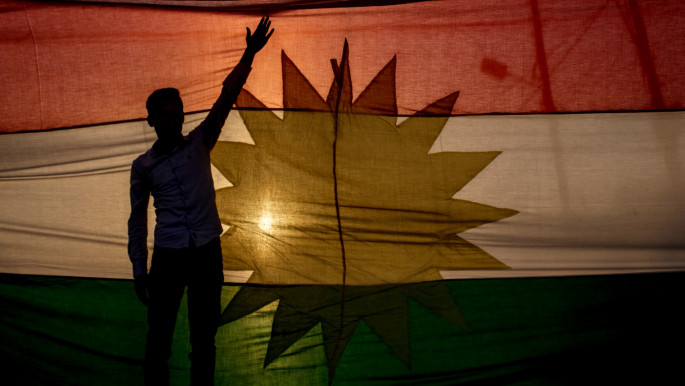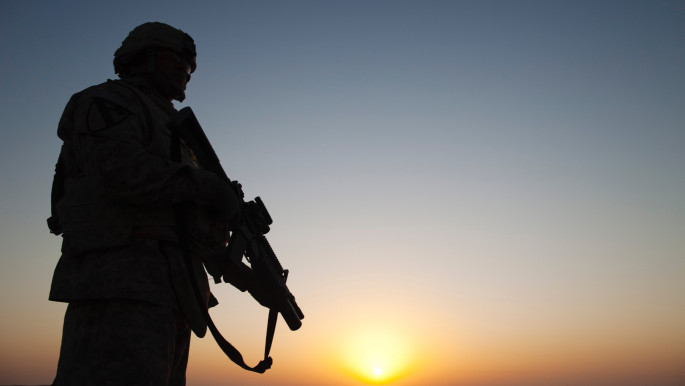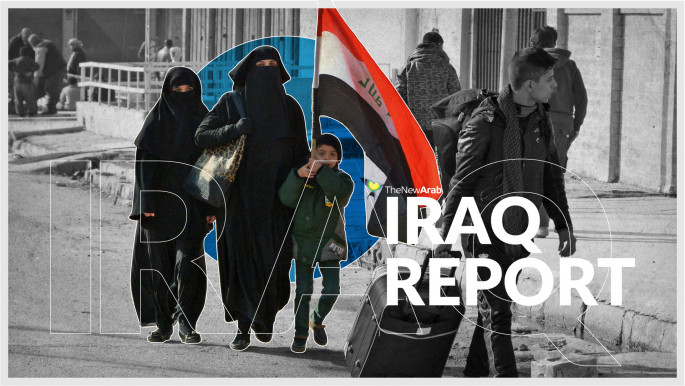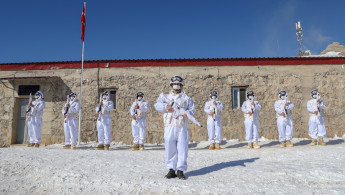The Iraq Report: PKK, Iran-backed militias threaten Turkey as tensions rise
Shia militants that are closely linked to Iran have once again issued threats against Turkey and promised to attack its military if their operations in Nineveh and Sinjar continue, setting the stage for possible increased cooperation between the outlawed Kurdistan Workers' Party, better known by their Kurdish acronym of the PKK, and Iran-backed Shia militias.
While Turkey faces off against this two-pronged threat, another NATO member is facing renewed pressure to abandon Iraq. The United States is due to complete a review of its troop numbers in Iraq and elsewhere in the Middle East, but has given indications that it is "comfortable" with the number of soldiers deployed.
This comes as reports emerge that Iraqi Prime Minister Mustafa al-Kadhimi may have cut a secret deal with Iran to prevent any further attacks on the US embassy in Baghdad to shore up his own domestic position as elections draw nearer.
Turkish civilians executed by Kurdish militants in Iraq
More than a dozen Turkish civilians were executed by PKK militants in northern Iraq on Sunday while militias close to neighbouring Iran have threatened to launch attacks against the Turkish military if it did not cease attacks against Kurdish groups Ankara says are members of outlawed terrorist organisations.
The hostages were killed after a botched hostage rescue operation in Gara near Dohuk launched by the Turkish military, who were only able to recover the bodies of the victims. According to the Turkish coroner's office, 12 of the victims were shot point blank in the head while the final victim was shot through the chest. Just days earlier, three Turkish soldiers were killed in clashes with PKK fighters in the same region.
 |
Turkey is once again discovering it has no shortage of enemies in Iraq |  |
The killings come as retaliation against Turkey for its continuing Operation Claw-Tiger military incursion into northern Iraq that has seen it enjoy cooperation with Iraqi Kurdish forces aligned with the Kurdistan Regional Government (KRG) in Erbil.
According to the Turkish government, Operation Claw-Tiger aims to prevent further PKK attacks being launched against Turkey from within Iraq's mountains that have been used by the Kurdish militants as hideouts for decades.
Although several of Turkey's NATO allies, including the United States, issued communiques condemning the executions, Turkish Foreign Minister Mevlut Cavusoglu lashed out at Western allies on Twitter for having "double standards" and a "selective approach".
 |
|
| The Iraq Report: Diplomatic spat with Turkey intensifies after deadly drone strike |
Cavusoglu was referring to Washington's support for the People's Protection Units (YPG) in Syria that has long been a target of Turkish military operations. Turkey says that the YPG is an extension of the PKK, while the United States has said they are a separate entity even as American officials and military commanders recognise they are linked.
The PKK is recognised as a terrorist organisation by Turkey, the US, and the EU, which makes the Western powers' relationship with the YPG all the more infuriating for Ankara which claims Western arms supplied to the YPG are being used to harm Turkish national security.
The United States, meanwhile, has argued that the YPG has been its most effective partner on the ground to counter the Islamic State (IS) group that conquered large swathes of Iraq and Syria in 2014 and was only defeated in 2018. Making matters worse for Turkey, however, are Iraqi militants who have close ties to Iran's Islamic Revolutionary Guard Corps (IRGC).
Harakat Hezbollah al-Nujaba (HHN) released a statement on Saturday threatening Turkey with military consequences if it continued to pursue its operations against PKK militants in Ninawa and Sinjar.
HHN referred to Ankara's forces as the "Turkish occupation forces" and slammed the Iraqi authorities for failing to prevent them from launching incursions and air raids against targets within Iraq's borders.
 |
Turkey has historically downplayed the threat coming from Iran-backed groups in favour of a single-minded focus on the PKK |  |
"We invite the Turkish occupation forces and their government to review their calculations [in Iraq]…and they have the American occupation forces that surpass them in numbers and equipment as an excellent example of what can happen," the statement said.
This draws parallels with the repeated threats made by pro-Iran groups against Ankara during the war with IS, leading to heightened tensions between the Turkish government and units that are now formally within the official Iraqi military's chain of command.
In 2016, Turkish President Recep Tayyip Erdogan directly threatened Shia militias fighting under the banner of the Popular Mobilisation Forces (PMF) with a "response" if they "terrorise the region", in reference to the Iraqi Turkmen town of Tel Afar that had been threatened by PMF fighters.
Weeks earlier, a well-known Shia militant known by his nom de guerre Abu Azrael insulted Erdogan as a "monkey" and a "rabbit", and threatened to unleash "men who will eat faces" upon Turkish soldiers at the Bashiqa military base.
This latest threat by HHN is therefore nothing new, yet Turkey has historically downplayed the threat coming from Iranian-backed groups in favour of a single-minded focus on the PKK. This is likely due to the PKK being a more proximal threat and because dealing with them resonates with Turkish voters more.
The PKK is seen as a domestic issue, even if they are fought abroad. However, Turkey turning its guns on Iraqi pro-Iran groups will be seen by a war-weary and economically tired domestic audience as placing Turkish soldiers' lives at risk for yet another foreign misadventure.
 |
|
| Read more: Unpaid salaries and corruption fuel public anger in Iraqi Kurdistan |
Iran seeks to end US military presence in Iraq
US troop levels in Iraq and the wider Middle East are set to stay at similar levels for the foreseeable future despite Iranian attempts to squeeze Washington out of Baghdad, statements from the Pentagon have indicated.
The United States is currently in the midst of a review of its military presence around the globe, with speculation that it could be seeking to draw down its forces in certain theatres such as the Middle East to redeploy in areas where it could more effectively deter Chinese expansionism.
However, Defence Secretary Lloyd Austin is reportedly "comfortable" with the current level of deployment in the Middle East, with the Pentagon making it clear that its deployments are based upon threats emanating from Iran.
"It's about making sure that we have a robust enough deterrent capability in the Middle East," Pentagon press secretary John Kirby told reporters on Friday.
"On a day-to-day basis, it's very much on [Austin's] mind to make sure that we have both the fixed and the rotational capabilities in the region to deal with the threats that are posed by Iran," Kirby said.
 |
The PKK is recognised as a terrorist organisation by Turkey, the US, and the EU, which makes the Western powers' relationship with the YPG all the more infuriating for Ankara |  |
The US currently has some 2,500 troops in Iraq and 900 in Syria, two theatres Iran is heavily invested in. American forces are also deployed across large military bases dotting the region, including in Saudi Arabia, Bahrain, the UAE, and with its largest base being at Al-Udeid in Qatar.
Under the Obama administration, Austin was previously in charge of the Central Command, or CENTCOM, which has responsibility over the Middle East. He has now been promoted as Pentagon chief under Obama's ideological successor and former running mate, incumbent President Joe Biden.
This will likely irk Iran who earlier this month renewed its demand for American forces to depart Iraq where the two powers are engaged in a tug of war for influence and control over Baghdad's affairs.
 |
|
| The Iraq Report: US military drawdown will embolden Iran's proxies |
Iranian Foreign Minister Mohammed Javad Zarif said at the start of the month that the best revenge against the US for killing former IRGC Quds Force chief Qasem Soleimani early last year would be for American forces to leave Iraq.
His comments were echoed by Iranian President Hassan Rouhani who adopted a softer tone and expressed "hope" that the new Biden administration will review the more hardline policies adopted by former President Donald Trump.
Iranian pressure on the US to leave Iraq has been incessant, including IRGC-backed groups launching repeated missile and rocket attacks against American interests and particularly targets of immense symbolic importance such as the US embassy in Baghdad.
The embassy was attacked just prior to Soleimani's assassination by drone strike, demonstrating the Trump administration's will to draw and enforce red lines. However, it is unclear if Biden will behave in the same manner.
To that end, Prime Minister Kadhimi has apparently cut a secret deal with Tehran to halt further attacks on the US embassy, The New Arab's Arabic-language service reported last week. Kadhimi undoubtedly fears what a repeat of another display of US power will mean for the stability of his administration. Elections are just around the corner and he will be keen to avoid any disruption to his electoral agenda.
Meanwhile, Iran also has an interest in ensuring that they do not push Biden too far. Biden is viewed as a dove in Iranian circles compared to the hawkish Trump, yet they will be wary of backing the new president into a corner on the question of the nuclear deal and sanctions.
The Iraq Report is a regular feature at The New Arab
Click below to see the full archive
 |
|



